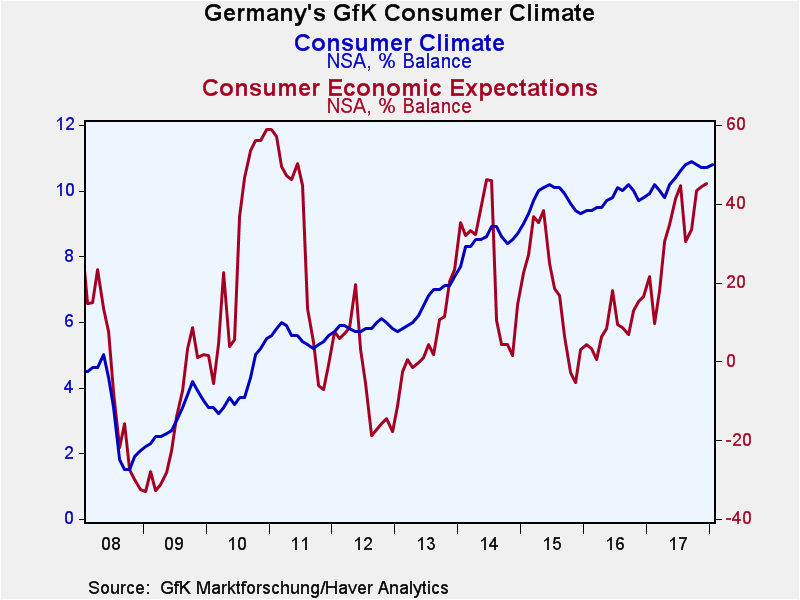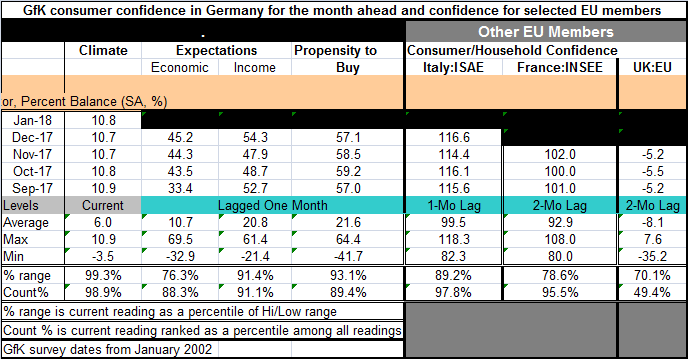 Global| Dec 22 2017
Global| Dec 22 2017German Confidence to Start New Year on a High Note
Summary
GfK estimates German confidence for the month ahead. For January 2018, GfK sees a rise in confidence to just short of an all-time high. This only entails a 0.1 tick higher in January. Still, the message is that German confidence, high [...]
 GfK estimates German confidence for the month ahead. For January 2018, GfK sees a rise in confidence to just short of an all-time high. This only entails a 0.1 tick higher in January. Still, the message is that German confidence, high as it is, still is advancing. Confidence is this high or higher only 1.1% of the time in Germany.
GfK estimates German confidence for the month ahead. For January 2018, GfK sees a rise in confidence to just short of an all-time high. This only entails a 0.1 tick higher in January. Still, the message is that German confidence, high as it is, still is advancing. Confidence is this high or higher only 1.1% of the time in Germany.
The components of confidence lag the headline by one month. For economic expectations, GfK sees a rise to the 88.3 percentile. For income, the survey jumps to 54.3 from 47.9 and to a 91.1 percentile standing in its historic queue (or count) of data. The propensity to buy, however, steps back a bit to a reading of 57.1 from 58.5 to log a still substantial 89.4 percentile standing in its historic queue of values. On balance, the whole of the German report is strong. All the main components of GfK confidence remain extremely high in their respective queues of historic data. Germany is firing on all cylinders.
Elsewhere in the EMU, Italian confidence is also high and climbing. The Italian index lags Germany by one month but December logs a reading of 116.6, a nice gain over November's 114.4 reading. This puts Italian consumer confidence in the top 2.2% of its historic queue of values. French and U.K. confidence measures lag Germany by another month. France last saw its index rise to 102 in November from 100 in October to post a 95.5 percentile queue standing, also an extremely strong reading. The U.K., a departing EU member, is a completely different story. Since it announced its plan to leave EU, British confidence has been depressed. In November, the U.K. measure did improve a bit to -5.2 from -5.5 in October. Still, that only translates to a 49.4 percentile standing, a reading that is just a hair below its historic median value (which occurs at a 50 percentile ranking).
On balance, the EMU confidence readings for its three largest members all are high and that is are powerfully reassuring. These readings support the high values we have been seeing for the EMU in the Markit PMI data. Europe appears to be heading into 2018 at more or less full speed with the U.K., of course, lagging considerably and with its own uncertain future.

Robert Brusca
AuthorMore in Author Profile »Robert A. Brusca is Chief Economist of Fact and Opinion Economics, a consulting firm he founded in Manhattan. He has been an economist on Wall Street for over 25 years. He has visited central banking and large institutional clients in over 30 countries in his career as an economist. Mr. Brusca was a Divisional Research Chief at the Federal Reserve Bank of NY (Chief of the International Financial markets Division), a Fed Watcher at Irving Trust and Chief Economist at Nikko Securities International. He is widely quoted and appears in various media. Mr. Brusca holds an MA and Ph.D. in economics from Michigan State University and a BA in Economics from the University of Michigan. His research pursues his strong interests in non aligned policy economics as well as international economics. FAO Economics’ research targets investors to assist them in making better investment decisions in stocks, bonds and in a variety of international assets. The company does not manage money and has no conflicts in giving economic advice.
More Economy in Brief
 Global| Feb 05 2026
Global| Feb 05 2026Charts of the Week: Balanced Policy, Resilient Data and AI Narratives
by:Andrew Cates






